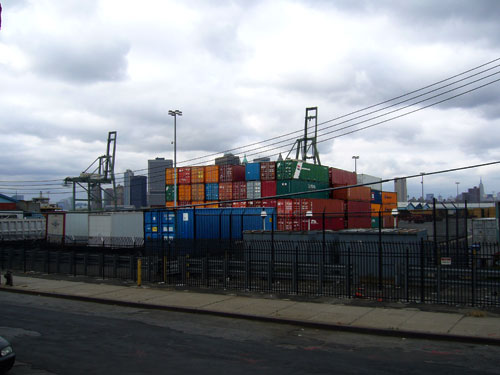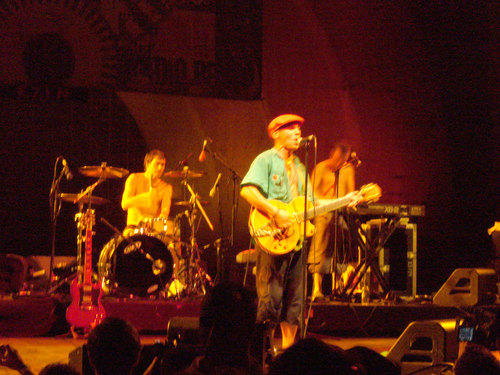August 31, 2006
A Question of Scale

I keep on trying to write a post on how difficult it is to write about difficult it is to write and talk about scale. I keep of failing cause, well it's really difficult to write and talk about issues of scale... So instead of trying to say anything meaningful I'm just going to ask for advice. What works can you recommend that deal meaningfully with the concept of scale? Works that address how we as humans can talk about phenomena that occur at scales of time and space that differ from our standard 5-6 feet above the ground and cycles of seconds and hours, days and months?
What I'm really interested in is the physical and conceptual tools that we use to do this work. Things like microscopes and the periodic table let us deal meaningfully with objects and actions that occur on small scales far out of sight of our naked eyes. But it strikes me that the tools to deal with scales slightly larger than human are severely lacking compared to both the ones we use to address the microscopic and grand reaches of outer space. But than again maybe I just haven't been exposed to the right tools.
August 29, 2006
The $300 Dollar Greens
A $300 dollar man was a draftee on the Union side of the US Civil War who opted to (and could afford to) pay a $300 fee in order to avoid military service. That's almost $6000 in today's dollars. Now imagine it's 1863 and you encounter a $300 man at a bar and get to talking and they start bragging about how much they are doing to fight against slavery. What would you think of such a person? Yeah, that's pretty much how I feel about this whole idea of "carbon neutral".
Sure the "$300 dollar greens" hearts might be in the right place, and there certainly are worse places their money can go, but just because it's cheap to buy off your conscious does not mean you can buy a real solution on the cheap, does it?
There are a whole lot of people out there in the world who just can not afford to go "carbon neutral". Would you rather help a person or plant a tree? That's a simple question with an infinitely complex answer, because helping the environment ultimately should help everyone on this planet is some small way. The health of the environment and the people who live in it are intricately tied together in ways more complex than we can easily untangle. Yet there is no doubt in my mind that an unhealthy chunk of the environmental movement is comprised of rich people buying a little peace of mind (aka ignorance) while protecting environments that most people in the world could never afford the carbon needed to visit, let alone afford to offset it somehow.
The bigger, more abstract and distant the problems, the easier it is to forget the real issues of inequality and poverty that stubbornly persist in the forgotten human environments of our own countries and cities. Yet as Majora Carter so intensely reminds us, these too are environmental problems. Hard problems, ones that won't go away by planting $300 worth of trees. Money is important, it can't be dismissed, but it can't be use to dismiss a problem either. These are problems that don't get solved by buying ugly lightbulbs, cramped cars and carbon offsets, they are problems that can only be solved by hard work, insight and maybe a little luck. So what are you doing with yourself and that $300?
August 28, 2006
Imaginary Feedback
What happens when you press a button? A button can trigger close to anything nowadays, but it's not what the button triggers that I'm interested in at the moment. Until our current age of screens a button pretty much by definition produced a bit of tactical feedback. You press a button and it presses back at you, giving you a confirmation that yes indeed that button was pressed.
Even in the screen age, most buttons still produce tactical feedback of some sort. Every letter of this text I type comes complete with a nice, Apple designed, bit of feedback, each button of the keyboard press gently back at me. The buttons on the screen are trickier, the tactical feedback tends to still exist, but slightly abstracted, you press the mouse, or trackpad or whatever button, and you feel a small kickback, albeit one a handful of inches away from the button you are actually looking at and in your mind clicking upon. On screen buttons tend to compensate for this distant tactical feedback by adding visual and or audio feedback to the mix.
When it comes to touch screens though all of sudden the tactical feedback it gone completely, all that is left is whatever audio or visual guides the designers have left in the system. It's for exactly that reason I dislike touch screens, despite their name they just don't feel right. When I use a Citibank ATM, which is often as they are my bank, I tend to tap the screen not with my finger, but with the side of my ATM card, there is something completely wrong about "pressing" a hard glass screen, that neither gives in nor gives back any feedback as you push upon it. Its a cold and unresponsive feeling, a dead interface into a live machine.
Of course for all my dislike of the touchscreen I've been a big Treo fan since the days it was a clamshell. Maybe it's the softer screen, or the fact that you don't usually need to use the touchscreen if you don't want to, or maybe it's just the superiority of the Palm interface design. I still prefer real buttons and the Treo has no shortage of those with a full QWERTY keyboard, but it also showed that a touchscreen could work maybe. Until it stops working of course, which my current Treo's has been doing intermittently the past couple days. The Treo is well designed enough that this is just a minor annoyance, so far it's always started working before I've gotten fed up enough to call up insurance for a replacement. But it also led to an interesting observation. When the touchscreen is not working it literally feels different, harder, as if a secret mild tactical feedback mechanism just disappeared.
Odds are this is a psychological phenomena. I touch the screen and because I get no visual or audio feedback somehow my brain feels the screen differently. Yet every time the touchscreen cuts out it feels distinctly like I can feel the hardness of screen before my eyes register the failure of the touch to work. Its as if the eyes-fingers-consciousness circuit is faster than the simple eyes-consciousness one. Either way, when the touchscreen is working it seems like somewhere in my mind, the act of touching a handheld screen and seeing visual feedback of a button press is creating some sort of phantom tactile feedback. A subtle but real impression that screen is softer, has more give, than it really does. Does that mean there is hope for full touch screen interfaces? If the long circulating rumors about Apple's new video iPods are true, it sounds like Steve Jobs is better there is. Me, I'm not so sure, I still like to press real buttons.
Paint Jet Printing
 Paint Jet Printing is a long running project of mine where I've been building a "paint jet printer". The goal is to print out digital images I've created using sign painters enamel or alternatively to give one particular answer to the question: "How do you get an image off a computer screen?" The site collates the rough history of the project so far, and if things work out will document the future developments of it all too...
Paint Jet Printing is a long running project of mine where I've been building a "paint jet printer". The goal is to print out digital images I've created using sign painters enamel or alternatively to give one particular answer to the question: "How do you get an image off a computer screen?" The site collates the rough history of the project so far, and if things work out will document the future developments of it all too...
August 26, 2006
Events and Notices
Not sure if this overlaps at all with my readership but, I'm currently looking for a good patternmaker/samplemaker for men's wear in New York City. Please feel free to email me any recommendations.
I'll be in San Francisco this coming week from August 30th-September 3rd, love to meet up with any readers and/or lost friends, just shoot me an email. Thursday is probably the best day.
I'll be in Pittsburgh for the Emergence 06: Service Design Conference, where at the moment I think I'll have one acquaintance who I've met all of once. If you read this blog and are planning to be there I want to meet you.
The Come Out and Play Festival is in New York September 22-24th, Payphone Warriors a game I played a leading role in designing will be played, come check it out!
The next weekend, September 29-30th I'll be at the Identity and Identification in a Networked World symposium at NYU. Again any readers that are planning to be there, give me a shout so we can be sure to connect.
August 23, 2006
Another Time

Every once and a while you catch a moment that makes you precisely aware of the sort of things you take for granted. I cherish those moments, it's rare opportunity to actually be able to see yourself in a bit of perspective.
I had one today after placing an order for a small sample quantity of items from a large industrial company. Their New York rep sent an email saying they'd mail me an invoice, and being a sample I would need to prepay before shipment. Somehow that bewildered me, I knew I needed to prepay, but I was ready to swipe my debit card that instant, or at least send the numbers over. It just seemed so slow, so out of touch with the rhythms of my day to day. Especially since I pickup my mail maybe twice a month. I've been spending years trying to eliminate mail, now my whole project is on hold till the US Postal Service comes through? How slow, how primitive! And all that was before I realized the invoice wasn't even getting mailed from here in NY, on reread it seemed like it was getting mailed from Switzerland...
Of course the real primitive here is me. I've been living too much of my life on internet time, instant gratification time, always on, high speed download time... If I want to get into the business of physical goods I need to learn the rhythms and pacings that make them work. One step at a time was the mantra when I finally learned how to make physical computing projects work, and that is probably how I'll need to address the issues of manufacturing real goods, things with real weight, things that move on the backs of trucks and across oceans in twenty-foot equivalent units. Maybe it will be frustrating, maybe it will be a welcome pace, either way I'll need change my perception of time, my culture of time, just a little to make it work.
August 20, 2006
Verticality in Advertising (Fractal Chinatown)

It took me six weeks of subletting in this building to realize this fire escape signage only really worked well because Chinese can be read vertically. I suppose if english functioned the same way New York would be littered with these things on every block. Two potentially countervailing factors, most of New York does not have the same density of mixed commercial and residential streets that Chinatown and the Lower East Side have. It also might be illegal, the rules after all are different in Chinatown...
This building interestingly enough marks a sort of fractal border to Chinatown, it's technically in the Lower East Side, and while most of block is Hispanics being pushed out by upper middle class whites, this building is 90% Chinese. With the white money pouring back into the hood it may well demarcate a limit to Chinatown's explosive expansion into the hoods formerly known as the LES and Little Italy.
Truth in Advertising

What a clever way for Ben and Jerry to tell us their ice cream is probably full of rBGH!
August 18, 2006
The Value of Metcalfe's Law
For whatever reason Metcalfe's Law has been all popping up everywhere I look over the past 24 hours.
The July issue of IEEE Spectrum has an article "Metcalfe's Law is Wrong" that is probably the crystal under which all this attention can be formed.
Metcalfe's law basically states that a value of a network grows exponentially with the number of nodes. A telephone network with only one phone is worthless. One with two is usefully only to the few people who can reach those two phones. But a phone network with a million phones has a massive value. The authors of the IEEE article don't dispute the existence of "network effects", the fact that as nodes increase networks rapidly increase in potential value. What they dispute is the exponential math that Metcalfe, the inventor of Ethernet and founder of 3Com, uses. The authors instead argue for logarithmic growth, or something close to it. They are probably right.
They also make an important point that "Metcalfe's law" is not a law at all, but merely a empirical observation that serves as a useful guide for analysis. What they completely miss is the wide open flaw in Metcalfe's Law, which can be summed up in one word, value.
What the fuck does it mean when you say the value of a network increases, with the number of nodes? Well it depends on what sort of value you are talking about. A network of phones in a world of deaf people has no value no matter how many nodes it has. What a network gains when it adds nodes is not value but potential value. That potential value only can turn into "real" value when valuable content flows through the network from node to node. You just can't sit down with Metcalfe's law, in either the original exponential or new logarithmic version, and use it to calculate the value of your network based on the number of nodes. All those nodes are worthless if they don't have anything to say to each other.
You can build a network, you can get a guideline of it's potential value, but to unlock it you first need to figure out just what value you are talking about. And then you need to get that value into the network in a way that is communicable and then and only then will the network actually begin to produce the values you want.
update: not 10 minutes after I posted this I stumbled on Metcalfe himself responding to the IEEE article in quite an interesting manner. And as usual Fred Stutzman has some interesting things to say as well.
August 15, 2006
The Innocence of Power Laws
I've been reading a short book - an essay, really - by John Kenneth Galbraith called The Economics of Innocent Fraud. It's his last work, written while he was in his nineties, not long before he died. In it, he explains how we, as a society, have come to use the term "market economy" in place of the term "capitalism." The new term is a kinder and gentler one, with its implication that economic power lies with consumers rather than with the owners of capital or with the managers who have taken over the work of the owners. It's a fine example, says Galbraith, of innocent fraud.
- Nicholas Carr Rough Type: The Great Unread
I've long argued that the "natural" shape of most markets is a powerlaw, and that any deviation from that shape is due to some bottleneck in distribution. Get rid of the bottleneck and you can tap the latent demand in the market, unlocking the potential of the Long Tail.
- Chris Anderson The Long Tail: A billion dollar question
Many have noted the irony that my book on niches appears to be a hit. It will enter the NYT Bestseller list this week at #13 (moving up to #10 next week) and is already #14 on the WSJ bestseller list (moving up to #11 next week). I can live with that irony!
- Chris Anderson The Long Tail: The Long Tail economy
Rosen's answer could not possibly have been more honest. The best way, by far, to get a link from an A List blogger is to provide a link to the A List blogger. As the blogophere has become more rigidly hierarchical, not by design but as a natural consequence of hyperlinking patterns, filtering algorithms, aggregation engines, and subscription and syndication technologies, not to mention human nature, it has turned into a grand system of patronage operated - with the best of intentions, mind you - by a tiny, self-perpetuating elite. A blog-peasant, one of the Great Unread, comes to the wall of the castle to offer a tribute to a royal, and the royal drops a couple of coins of attention into the peasant's little purse. The peasant is happy, and the royal's hold over his position in the castle is a little bit stronger.
- Nicholas Carr Rough Type: The Great Unread
Part of the reason the book is successful, I believe, is because as I was writing it the smart readers of this blog helped improve the ideas, catch my errors and suggest dozens of applications and dimensions of the Long Tail I never would have thought of myself. So today's recognition is also a recognition of the power of tapping collective intelligence. I couldn't have done it without you!
- Chris Anderson The Long Tail: A top ten bestseller!
August 14, 2006
"We should all be concerned about the future because that's where we'll have to spend the rest of our lives." - Charles Kettering (supposedly)
August 10, 2006
Atlantic Yards (What Would Jane Jacobs Do?)
 (based on an image created by onNYTurf)
(based on an image created by onNYTurf)
I've avoided taking a stance on Atlantic Yards for just a bit too long now. If anything I was vaguely in favor of it. A basketball team for Brooklyn is a fabulous idea, and developing that dead zone of the actual Atlantic Railyards (as opposed to the larger area encompassed by the actual development plan) is pretty much a fail safe venture. There is not that much room to get worse than a dead railyard. Things of course get more complicated when the plan reaches out past the borders of those yards an into the destruction of people's homes, and that was the point where I had decided it just wasn't worth thinking about the issue anymore... For a while my main thought, was "why couldn't they have picked a better celebrity architect than the highly overrated Frank Gehry, and if it has to be Gehry couldn't it at least be the good Gehry?"
Two articles have changed all that, and are well worth reading. For one Chris Smith's New York Mag cover story gets down into the real details of the development "plan" and the further it get the clearer it is that this thing is poorly planned, at least from an urbanist standpoint, the economic and political side seem to have gotten far more attention. There is no thought for traffic, no thought for the impact on the school system, no thought for what happens to people after they hand over the cash to developer Bruce Ratner. Most horrifying to me is the fact that there seems to be no thought on the impact of the development on the subway system, even though it is being built precisely at the point where 13 out Brooklyn's 18 subway lines converge! And on top of a railyard connected to the LIRR terminal too! If Ratner really wanted to improve Brooklyn, the absolute first priority of his plan should be building a better Atlantic Avenue subway station, without it the only possible thing he can be proposing is a gigantic mess.
The second, more nuanced and perplexing article is Karrie Jacobs' "Jane Jacobs Revisited" in Metropolis Magazine. K Jacobs' (no relation to J Jacobs) is to smart to outright claim what J Jacobs would think about Atlantic Yards, but in the beginning she confesses to have never actually read J Jacobs, and in the end she pretty much confesses to cherry picking her way through the book.
Indeed there is a whole lot in J Jacobs' masterpiece that can directly be used to critique Atlantic Yards. The observations of what makes a successful street, the critiques of housing projects, the passionate call for short blocks, and it goes on. What is so frustrating about the article though is what is not said, Karrie's reading of Jane is not particularly wrong, J Jacobs is indeed a fan of "density, diversity and complexity"*. But what is so insidious about K Jacobs article is that it implies that the Atlantic Yards project actually meets these criteria. What Chris Smith's article makes clear is that Ratner's development does not even come close. Density sure, it has that, but with it's token low income housing, and the removal of almost all the offices due to political maneuvering, very little diversity is left. As for complexity, well if Karrie Jacobs had actually read some of Jane's other books, well then she would realize J Jacobs would be the last person to see complexity emerging from anything like Ratner and Gehry's plans.
Jane Jacobs was certainly not completely opposed to development plans, but her vision of the vibrant city has always been an organic one. It is readily apparent in Death and Life of Great American Cities but it only gets stronger and stronger in each of her successive books, minus perhaps the very last ones. Of course while her 1961 classic continues to be well read, no one at all seems to have read Economy of Cities or Cities and the Wealth of Nations. In those works it becomes far clearer that J Jacobs sees the healthy city as being one that is developed via an evolutionary and iterative process and the unhealthy one being developed via a political and overly planned process. If the Atlantic Yards development was something that had stemmed from the demands and needs of the community, say the need for an extended port, or the need for an aqueduct, or a more extensive business center to meet growing needs, than yes J Jacobs might have been all for it. But when the demand comes from a developer's greed, spliced with a politician's desire to build an arena, well that's exactly what J Jacobs sees as killing cities.
The final argument for Atlantic Yards that once influenced me a bit was Steven Johnson's, that Brooklyn lacks a vibrant downtown and Atlantic Yards could provide it. Now it is true that downtown Brooklyn is pretty dismal, but it does have one incredibly vibrant zone, the shopping area on and around Fulton Street (somewhat misleadingly called Fulton Mall). What makes Fulton Mall so relevant to Atlantic Yards though is where it dead ends, where the vibrancy stops, right at Bruce Ratner's first development in Brooklyn MetroTech center. It's almost casebook Jane Jacobs, the street grid ends, the massive development begins and the soul of the city just dies. Like Johnson I'd love to see a vibrant commercial core develop in Brooklyn and the Atlantic Railyards are a natural site. But from both history and Ratner's own published plans it is clear that the Atlantic Yards development is not the project that will make that goal happen.
So what would make that happen? I certainly can't claim to have the answer, but if I were Ratner the first thing I'd do is fire Mr Gehry and hire someone like Joshua Prince-Ramus who at least clearly makes strong attempt to understand just what he is actually building.
* although it should be noted that she saw very clear limits to density, and I find it highly likely she would see Atlantic Yards going way past that limit.
100% For the Planet
How do you react when you see a label that says something like "1% For the Planet"? I mean it's great that they are making an effort, and 1% is infinitely more than 0% — but 1%, is that supposed to impress us? We are talking profit here, and that means the other 99% is going into the owners pockets (or to be fair it might get reinvested in the company.) 1% percent is a nice token gesture for sure, but how about seeing some labels that say "100% for the Planet"? Or really I'd prefer "100% for the World", something about being "for the planet" makes me think these companies care more about the environment than the people who are integrally connected to it...
August 08, 2006
August 07, 2006
Infoface
A question: When you think about the word "interface", do you think about it as being a way to interact with information, or as a way to interact with a device or program?
August 03, 2006
Hot Hot Networks
As the current summer heatwave takes itssmall toll on the internet, it's pushed a couple hidden issues a little closer to the surface. One is just how fragile the internet is (and is not) and the other just how god damn hot and power hungry it is.
In Albert-László Barabási's Linked he demonstrates that the internet forms what he calls a scale-free network. One of the interesting characteristics of a scale free network is that it is virtually indestructible as a communications medium. No matter how many nodes you take out, big ones, small ones, whatever, you still, in his models at least, you can still communicate across the network. You can slow the network down incredibly by taking out key nodes, but you can not destroy it as a communications tool.
But that is the internet as this big thing, this mass that Barabási studied and then modeled via graph theory. That is not the same thing as what we can call your "personal internet". Your personal internet is your email, your blog, your online bookmarks, your MySpace page, and the like. The precise contents vary from person to person, maybe X relies on MyYahoo and Y on YayHooray. But regardless of the specifics your personal internet is a handful of sites and they are not nearly as resilient as some hypothetical scale free entity. Just taking out your email for a few hours can pretty much destroy your internet communications, while having your site, or main news-source out can leave you hanging half off the network. Or as someone on one of my mailing lists tossed out: "And of course if both Dreamhost and GMail go down at the same time, then that means it's time to go onto the roof and have a beer." Which of course is a great idea, but how many days do you want to stay on the roof, and how much beer do you have stocked up?
The second issue is in a way about Moore's Law, you know the one about computer speeds doubling every 18 months or two years. I've had a minor disagreement with Art Kleiner over the past couple years on just how seriously to take Moore's Law. Been highly skeptical of any attempt to prediction the future with the accuracy of a law, I don't think it can be taken for granted. In fact at least anecdotally it seems to be slowing down now. I just replace a four year old laptop, and I went from a single 1.9GHz chip to a dual 2GHz, which is barely double in four years. Part of this is a technological issue, and part is an issue of demand, speed just is not as important a selling point as it once was and hence there is less drive to push it at the speed of Moore's law. Art's point is that you need to factor in price, that Moore's law is better seen as a doubling of processing speed per dollar rather than a raw doubling, and it's a good point.
But what neither of us have factored in, is the cost of computing in terms of how much power it is consuming and how much heat it is generating. Faster chips run hotter and suck in more electricity. While chip designs are getting more efficient at least at times, the over all trend still seems be towards more power consumption and more hot hot hot servers and laptops. Unless this can get reigned in, Moore's law might just run smack into a brick wall of rising power costs. It might still be possible to double the cost of computing per dollar of microchip every couple years, but it might not be worth the added cost on your electric bill...
update: reader Gummi sends this link, a few choice quotes:
"Chips will be as hot as nuclear reactors by the end of the decade... and as hot as the surface of the sun by 2015, if they continue on their current design path, according to Pat Gelsinger, Intel's architecture chief."
"The nub of his presentation is this. Moore's law will remain true for the next ten years: but the thermal properties and power requirements of future chips conforming Moore's rule of thumb will be unsellable, unless design approaches are radically revised.
""'No one,' as Gelsinger puts it,'wants to carry a nuclear reactor in their laptop onto a plane'. "

 Manu Chao live in Brooklyn
Manu Chao live in Brooklyn